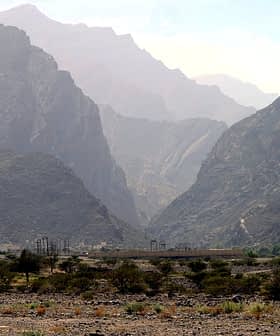In its quest to meet global food demands, conventional agriculture has depleted vital land resources through unsustainable practices, ironically threatening future food supply.
According to Dirt: The Erosion of Civilizations, David R. Montgomery emphasizes the stark contrast between sustainable agriculture and conventional farming practices.
Conservation agricultural systems… have revitalized the olive production industry, bolstered resilience, improved soil and land productivity potential, and mitigated land degradation.
Montgomery argues that adopting sustainable agricultural practices is crucial for soil’s long-term health and human societies’ survival.
He argues that humanity can ensure a more resilient and productive future for agriculture by learning from the mistakes of past civilizations and embracing more sustainable methods.
See Also:Experts Back Olives in a Hotter, Drier WorldAmir Kassam, a visiting professor at the University of Reading’s School of Agriculture, policy and Development and a United Nations Food and Agricultural Organization global forum member, advocates for transitioning to more sustainable farming practices.
“The European Union has inherited a form of industrialized synthesized farming that has become the
prevailing agricultural norm, augmented by tillage and agrochemical technology, which is
detrimental to soil health, useful insect populations and biodiversity,” he told Olive Oil Times.
“This model operates on a simplistic input-output basis; increased inputs should yield greater outputs,” Kassam added. “However, this approach is detrimental to soil and landscape health.”
He noted that conventional agriculture can adversely affect soil health in various ways.
Intensive tillage and monocropping practices frequently result in soil erosion, whereby the topsoil is either washed or blown away. This diminishes the soil’s fertility and capacity to retain water and nutrients.
The dependence on chemical fertilizers and pesticides in conventional farming depletes the soil’s organic matter, essential for sustaining soil structure, fertility and microbial activity.
Furthermore, heavy machinery can cause soil compaction, which reduces porosity and impedes root penetration, consequently hindering water infiltration and drainage.
The accumulation of harmful chemicals from synthetic fertilizers, herbicides and pesticides can disrupt microbial communities and diminish soil biodiversity.
Additionally, an over-reliance on chemical fertilizers may result in nutrient imbalances within the soil, leading to deficiencies or toxicities that adversely affect plant growth and soil health.
“The concept can be likened to an input-output model, wherein it is assumed that an increase in inputs results in a corresponding increase in outputs,” Kassam said. “However, this incremental approach, along with intensive tillage has become problematic, particularly concerning soil health.”
“Modern agricultural practices have ceased prioritizing critical inquiries, such as the overarching objectives of farming systems for the farmers, community and the environment,” he added. “The focus has shifted away from sustainability and has become solely centered on yields and profitability, paying little attention to environmental consequences and sustainability.”
Kassam warned that this shift has led to agricultural land degradation and topsoil erosion. He added that the situation has become increasingly severe as the size of agricultural machinery increases, leading to dust storms in the United States and Europe.
“A deeper understanding of sustainable agricultural practices is essential for promoting conservation-oriented regenerative agriculture,” he said. “The fundamental principle of conservation agriculture is to minimize soil disturbance by avoiding tillage, cover the soil with biomass mulch and diversify the cropping system, thereby protecting the ecosystem and the diverse useful organisms that inhabit it.”
“It is crucial to maintain soil cover with biomass mulch to approximate natural conditions as closely as possible,” Kassam added. “Additionally, the cycling of organic matter is vital, as the mulch safeguards the soil surface from the impacts of storms, rainfall and wind while also providing nourishment for soil organisms and increases soil organic matter and plant nutrients.”
He argues that by adopting more sustainable practices, it is possible to mitigate these detrimental effects.
Among these practices is mulching, which Kassam said is an excellent source of crop nutrients. These nutrients are essential to maintaining biodiversity and creating natural habitats for pest predators.
While olive trees are well-known for their ability to thrive in marginal soils, olive farmers have noticed the negative impact of land degradation on their trees.
“Farmers, including olive farmers, are seeing a degradation of the land because of tillage and
poor management of soil health and crop diversity, resulting in declining yields,” Kassam said. “In recent decades, many farmers have transitioned from conventional tillage practices to
conservation agriculture in annual and perennial systems, including and organic systems.”
“Additionally, farmers in the olive sector are compromising soil health by engaging in practices that disrupt the soil health through regular tillage,” he added.
See Also:How Intensive Agriculture and Olive Cultivation Impact Soil HealthChristiane Wassman, the co-owner of the award-winning producer Rastrello in Umbria, said she and her family have successfully revitalized several century-old olive oil trees on their farm by implementing sustainable practices, particularly mulch.
Mulching is vital in water conservation, particularly in olive farming within regions susceptible to drought.
Techniques such as drip irrigation, which delivers water directly to the roots of olive trees, can significantly decrease water consumption while ensuring that the trees receive sufficient hydration. Furthermore, applying mulch around the base of the trees helps retain soil moisture and minimize evaporation.
“Drip irrigation is particularly effective in sustainable agricultural practices,” Wassman said. “This method preserves soil integrity and enhances moisture retention, even during rainfall.”
“Without such practices, it is estimated that up to 70 percent of moisture may be lost due to runoff, as water fails to penetrate the soil effectively,” she added. “Therefore, it is crucial to maximize rainwater infiltration and retention. Immediate sealing and mulching after plowing further contribute to these objectives.”
According to Juan Vilar, a strategic consultant for the olive oil sector, irrigation has become an urgent need in Spain.
“Although around 30 to 35 percent of Spanish olive groves have irrigation, 65 percent do not,” he said. “They do not have the infrastructure for irrigation.”
Vilar added that during the country’s historic drought, virtually no olive groves were irrigated as large cities in the southern Spanish region of Andalusia implemented water restrictions.
“Things will become more difficult in the summer, especially if there is insufficient rain in the spring,” he said.
Sustainable agricultural practices within the olive oil sector are increasingly gaining traction.
One such practice is conservation tillage, which minimizes soil disturbance and helps preserve soil structure and organic matter.
This method reduces erosion and enhances water retention, ensuring olive trees have access to nutrients and moisture for optimal growth.
Another significant practice is crop rotation, which involves alternating olive trees with other crops to mitigate the accumulation of pests and diseases.
This approach also improves soil fertility by allowing various plants to enrich the soil.
“In Andalusia, approximately 40 percent of agricultural practices in olive farming are already aligned with sustainable farming management based on conservation agriculture,” Kassam said. “Additionally, the implementation of drip irrigation techniques complements conservation agriculture, demonstrating effective synergy in sustainable agricultural practices.”
“Conservation agriculture systems and their associated practices significantly contribute to the enhancement of productivity, economic viability, environmental sustainability and social performance within the olive production sector in the arid and semi-arid Mediterranean regions of southern Europe, North Africa and West Asia,” he added. “These practices have revitalized the olive production industry, bolstered resilience, improved soil and land productivity potential, and mitigated land degradation.”









